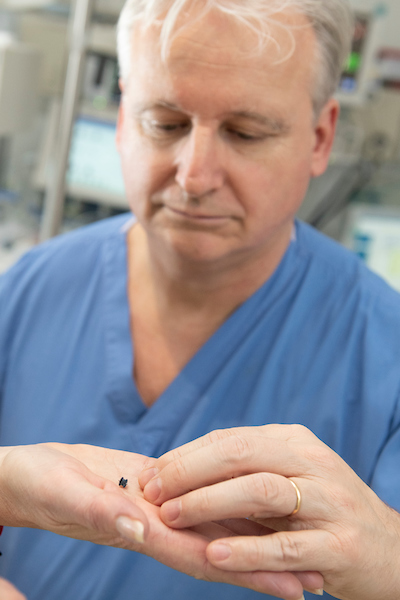 More than 80 premature babies with patent ductus arteriosus (PDA) – a life threatening congenital heart defect which causes a leak between blood vessels from an opening in the heart – have been treated at Royal Brompton Hospital using a pioneering catheter procedure.
More than 80 premature babies with patent ductus arteriosus (PDA) – a life threatening congenital heart defect which causes a leak between blood vessels from an opening in the heart – have been treated at Royal Brompton Hospital using a pioneering catheter procedure.
Professor Alain Fraisse, consultant paediatric cardiologist, carried out the first of this type of catheter intervention at the Trust.
The procedure involves inserting a small device made from wire mesh into the heart (through a catheter inserted via a vein in the baby’s leg) to block the opening in the heart to stop the leak. It is guided into place using echocardiography imaging, which uses sound waves to capture moving images and is the most widely used technique for non-invasive imaging of the heart.
The procedure takes just 20 minutes and avoids the need for open heart surgery – a complex procedure in tiny babies.
Professor Fraisse said: “This procedure offers young paediatric patients and their families hope through a less invasive treatment than surgery, with a shorter hospital stay with no chest scar.”
Babies sent to Royal Brompton for treatment were referred by 20 different neonatal intensive care units across the country, as the Trust is the only centre in the UK to have a PDA referral team, which was set up and is led by paediatrics matron Claire Buckle.
Claire said: “The numbers show that we really are leading the way for the treatment of patent ductus arteriosus and we have successfully treated infants weighing as little as 800g.”
The large number of babies treated at the centre has been facilitated with help from Royal Brompton & Harefield Hospitals Charity, which funded the purchase of a new incubator, allowing the team to treat twice as many babies.
Gill Raikes, chief executive of the charity, said: “It’s wonderful to be able to support the work Professor Fraisse and his team are doing for premature babies and their families, as without their interventions many of these infants would not survive.”
Professor Fraisse added: “We’re extremely grateful to the charity for providing funds for another incubator, allowing us to treat more babies.
“Our success has been a real team effort, combining the talents and expertise of cardiologists, anaesthetists and nurses. It’s thanks to this that we have been able to use this pioneering procedure to treat the largest number of premature babies in Europe.”
”Our success has been a real team effort, combining the talents and expertise of cardiologists, anaesthetists and nurses. It’s thanks to this that we have been able to use this pioneering procedure to treat the largest number of premature babies in Europe.”
